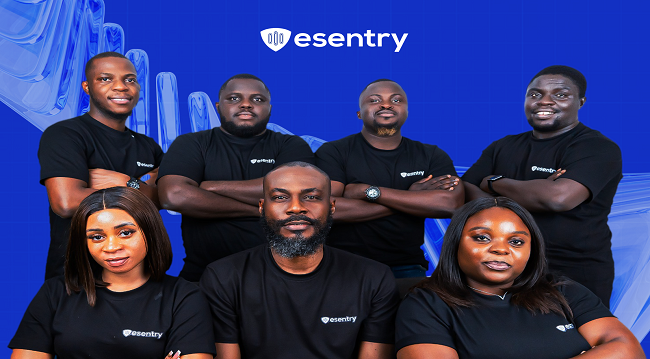E-Business
FG to Punish Defaulters of EO3, IT Clearance Directives

President Muhammadu Buhari, has vowed to deal with defaulters of the Executive Order 003 (EO3) and has also directed the National Information Technology Development Agency(NITDA) to report any government agency that fails to comply with the new IT Clearance directive to the government for punitive action to be taken.
Executive Order 003, requires all Ministries, Departments and Agencies (MDAs) of Government to grant preference to local manufacturers of goods and service providers in their procurement of goods and services, would serve to create jobs, especially for the youth, and generate wealth.
Buhari at 2018 e-Nigeria international conference and exhibition, organised by NITDA in Abuja, said that the warning became necessary in view of his administration’s determination not to fail in its quest to eliminate corruption in government businesses and in the wider society.
He noted that NITDA’s initiative focused on the Registration of IT Contractors and Service Providers in collaboration with other regulatory bodies with special emphasis on competencies.
According to him, this will ensure the delivery of quality IT projects, as well as facilitate the development of indigenous IT companies in line with global
“You may also recall the remark about NITDA’s efforts at enforcing Federal Government’s directive on ensuring that all ICT projects in the country are cleared by it before implementation.
“This will ensure that government’s ICT procurements: Are transparent; Aligned with government’s IT shared vision and policy; Lead to cost savings through promotion of shared services; avoid duplication; ensure compatibility of IT systems and improve efficiency in government business; enforce the patronage of indigenous companies where capacity exists and uphold the highest standards for service delivery.
“In this administration’s efforts at ensuring full realisation of these objectives, a new circular was issued in August this year, to reiterate this directive.
 Buhari
Buhari
Buhari observed that NITDA and other relevant government agencies had taken this up by creating the enabling environment through the development of policies, frameworks, standards and guidelines.
He said, “I am aware that some of these regulatory instruments have been subjected to critical scrutiny and revision through a series of stakeholder engagements.”
He, however, maintained that efforts should be intensified to make them public and to sensitise the public about the value of the regulatory instruments.
The President noted with delight the enforcement of the use of the policy on Treasury Single Account (TSA), the Integrated Payroll and Personnel Information System (IPPIS) and the Bank Verification Number (BVN) and the impact they had made on the administration’s public financial management reforms.
Buhari added that the consolidation of accounts and elimination of ghost workers that resulted in a combined monthly savings of about N24.7 billion, the TSA facilitated the recovery of huge sums of money, including the N1.6 billion that was recently recovered from a single account.
He said the policy initiatives had reinforced his administration’s fight against corruption by ensuring transparency and accountability in government business transactions.
According to the President, the success of his administration’s Social Investment Programme, which is seen in many quarters as the largest and most ambitious social safety net programme in recent history, relies heavily on the application of ICT.
He observed that the components of programmes such as the N-Power, Government Enterprise and Empowerment Programme (GEEP), the Home Grown School Feeding Programme (HGSFP) and the Conditional Cash Transfer (CCT) all leverage on ICT.
He disclosed that the programmes had so far benefited over nine million Nigerians.
The president revealed that the NITDA, in collaboration with the National Social Investment Office (NSIO), was coordinating federal government’s initiative of establishing eight Innovation Hubs.
He added that the eight Innovation Hubs would be sited one in each of the six geo-political zones and one each in Lagos and Abuja.
President Buhari explained that the purpose of establishing these hubs was to facilitate digital capacity building for immediate employment, entrepreneurial skills development, job and wealth creation.
“All these are aimed at promoting the digital economy in an era of disruptive technology through effective regulations,’’ he said.
The president, therefore, enjoined the Conference to come up with “innovative ideas, workable and implementable recommendations that would help and enhance government’s efforts at creating the enabling environment for the promotion of the digital economy in an era of disruptive technologies, considering our peculiarities as a country.’’
In his remarks, the Director-General of NITDA, Dr Isa Pantami, lauded President Buhari for the issuance of the Presidential Executive Order 003 and 005.
The Executive Order 003 mandates all ministries, departments and agencies to give preference to locally manufactured goods and services in their procurement of information technology services, in order to strengthen its implementation as well as provide clear policy directions.
Presidential Executive Order 005 which was also issued in February, is part of the administration’s deliberate efforts and strong commitment at strengthening the role of Science, Technology and Innovation in the country’s socio-economic development.
Pantami disclosed that over N30billion had so far been saved by the federal government following the implementation of its IT and ICT policies and programme.
The conference has “Promoting Digital Economy in an Era of Disruptive Technologies through Effective Regulation” as its theme.
E-Business
Kaspersky Discovers New Phishing Campaign Exploiting Google Tasks Notifications to Steal Corporate Credentials

Kaspersky has uncovered a new phishing scheme that abuses legitimate Google Tasks notifications to trick corporate users into revealing corporate login credentials.

By leveraging Google’s trusted @google.com email domain and notification system, attackers bypass traditional email security filters and exploit users’ trust in familiar services.
In this campaign, victims receive an authentic-looking notification from Google Tasks with the subject line “You have a new task.” The message creates the illusion that the recipient’s company has adopted Google’s task management tool, pressuring them to act quickly. The notification often includes elements of urgency, such as a high-priority flag and a tight deadline, to prompt the victim’s immediate response.
Upon clicking the embedded link, users are directed to a fraudulent form disguised as an “employee verification” page, where they are asked to enter their corporate credentials under the pretense of confirming their status. These stolen credentials can then be used for unauthorised access to company systems, data theft, or further attacks.
“Google’s vast ecosystem of services gets exploited by scammers. The scheme with Google Tasks is part of a broader trend observed before and continuing into 2026, where cybercriminals misuse legitimate platforms to distribute scams and phishing.
Notifications originating from legitimate domains naturally evade many spam and phishing filters, while the social engineering aspect – making it seem like an internal company process – lowers the victim’s guard,” comments Roman Dedenok, Anti-Spam Expert at Kaspersky.
E-Business
esentry 2025 Report Shows Healthcare, Financial Services and Telecoms as Staging Grounds for Increased Cyberattacks in Africa

Cyber adversaries targeting African organisations are increasingly shifting away from opportunistic attacks toward deliberate, sector-specific campaigns aimed at the continent’s most critical digital infrastructures, according to the esentry 2025 Annual Report released by esentry, Lagos-based Africa’s leading indigenous Managed Security Service Provider (MSSP).

The report identifies healthcare, financial services, and telecommunications as the primary staging grounds for high-velocity cyberattacks, reflecting a growing focus on sectors that underpin economic stability, public welfare, and digital connectivity across Africa.
The findings are drawn from one of the largest cybersecurity datasets analysed in the region. Over the course of 2025, esentry processed more than 31 billion security events, generating 3.5 million alerts and successfully blocking over 15,000 malicious attempts. This monitoring scale shows that, while traditional financial institutions remain a core target, the threat landscape has expanded to include digital lending platforms, healthcare systems that store sensitive personal data, and telecom operators responsible for national and regional connectivity.
Within the healthcare sector, the report highlights ransomware as the most acute risk, with attackers frequently exploiting exposed Remote Desktop Protocol (RDP) services to compromise patient data and disrupt essential medical operations. In financial services, organisations are facing a surge in credential abuse, insider-related threats, and info-stealer malware designed to enable fraud and unauthorised access. Telecommunications providers are increasingly targeted by highly tailored phishing campaigns and attacks on exposed web services, which aim to harvest credentials and compromise customer data.
Commenting on the findings, Gbolabo Awelewa, Chief Business Officer at esentry, said the nature of cyber threats across Africa has evolved significantly. “The threats we are seeing today are deliberate, informed, and carefully tailored to local enterprises. Attackers are exploiting trusted access and moving quietly within networks, which makes early detection critical. Our coordinated cybersecurity model, spanning Defence, Intelligence, Offence, and Security Engineering, allows us to combine scale, speed, and deep contextual insight to detect and neutralise threats before they escalate,” Awelewa said.
A defining trend identified in the report is the shift from overt system exploitation to the abuse of legitimate access. By leveraging compromised credentials and ‘living-off-the-land’ techniques, attackers can blend into routine enterprise operations and significantly delay detection. This approach has compressed the attack lifecycle, enabling adversaries to move from initial access to full operational impact in fewer than 15 days.
To counter this acceleration, the report emphasises the importance of early detection and automated response. esentry says it currently contains low-complexity incidents in under 90 seconds, using a combination of structured threat hunting and centralised telemetry to anticipate and absorb attacker pressure rather than reacting after damage has occurred.
As African organisations continue to digitise, the esentry 2025 Annual Report positions itself as a critical reference point for understanding the continent’s evolving cyber threat environment. The report concludes that protecting Africa’s digital trust will require a shift away from fragmented security tools toward disciplined, coordinated defence frameworks, what esentry describes as a unified Phalanx formation.
E-Business
AfDB, UNDP Launch $10Bn AI Initiative for Africa

The African Development Bank Group (AfDB) and the United Nations Development Programme (UNDP) have launched an ambitious $10 billion project to support the adoption of Artificial Intelligence (AI) across the continent.

The 10 Billion Initiative intends to accelerate ethical AI adoption and inclusive digital economic growth in Africa.
The initiative follows the Nairobi AI Forum, which took place earlier this month in Kenya and brought together governments, private sector leaders, development partners, and tech innovators to define pathways for impactful AI adoption.
According to the organisations, the strategy is a co-designed collaboration between the Bank Group, UNDP, and commercial partners that aims to raise up to $10 billion by 2035.
The resources will be used to create up to 40 million new jobs across the continent by 2035, through targeted investments that provide the groundwork for AI and accelerate widespread adoption in everything from entrepreneurship and regional data infrastructure to policy frameworks and skill development.
Nicholas Williams, AfDB Group ICT operations division manager, commented: “As a leading multilateral development institution, the bank is leveraging its comparative advantage to ensure Africa is not left behind in the AI era.
“The AI 10 Billion Initiative paves the way for expanded partnerships and sustained investments that will accelerate AI entrepreneurship, strengthen data and infrastructure ecosystems, and support inclusive growth across the continent.”

 General News3 days ago
General News3 days agoKPMG Strengthens Africa Leadership to Support Long‑term Growth Across the Continent

 News2 days ago
News2 days agoNITDA Equips Federal Character Commission with Data Tools to Drive Public Sector Reform

 E-Business3 days ago
E-Business3 days agoesentry 2025 Report Shows Healthcare, Financial Services and Telecoms as Staging Grounds for Increased Cyberattacks in Africa

 E-Financial2 days ago
E-Financial2 days agoHistory is Watching: Tinubu’s Moment to Rescue Nigeria’s Stolen Future

 Telecom2 days ago
Telecom2 days agoTelecom Giant MTN Injects N1.0 Trillion CAPEX into Network Expansion

 E-Financial3 days ago
E-Financial3 days agoFlutterwave Rises from Lagos Startup to Africa’s Fintech Powerhouse

 News3 days ago
News3 days agoNigeria, EU Ink Research, Innovation Deal Worth €100Bn

 E-Business2 days ago
E-Business2 days agoKaspersky Discovers New Phishing Campaign Exploiting Google Tasks Notifications to Steal Corporate Credentials




















